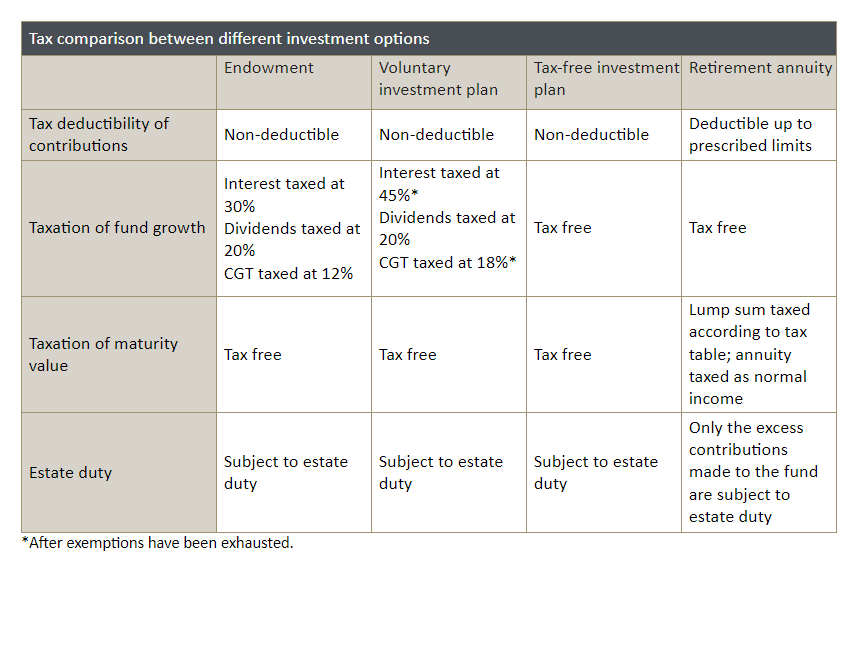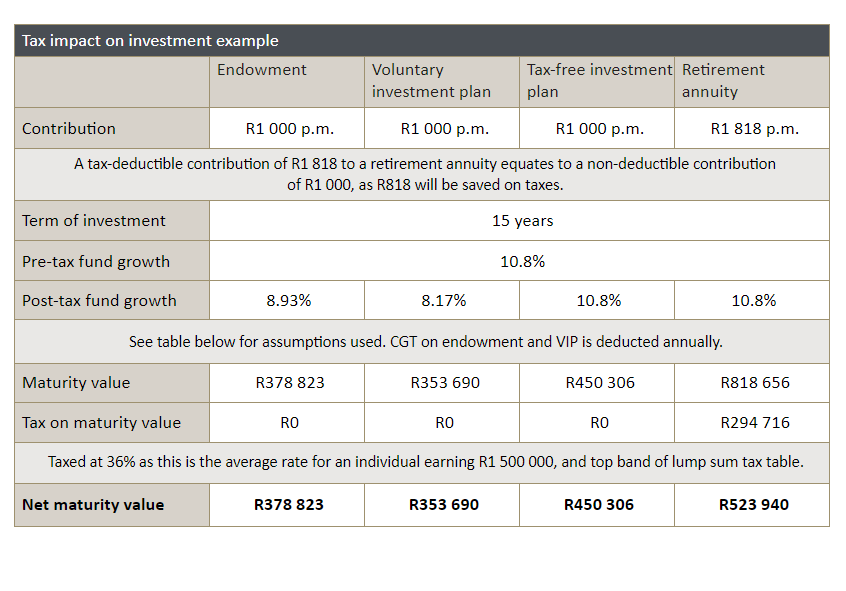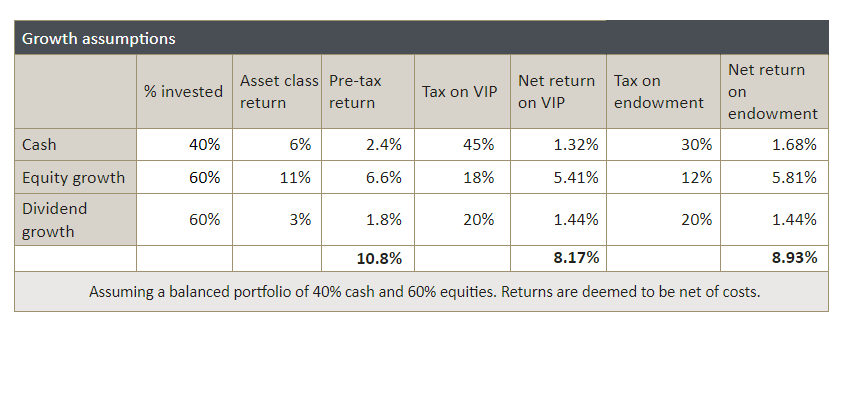Understanding the tax benefit
However, this argument ignores the fact that the tax rates of retirees are normally significantly lower than prior to retirement when they received the tax benefits from contributions. It also ignores the benefit of tax-free growth within the portfolio as well as benefits in estate duty. The table below compares an endowment, a voluntary investment plan, a tax-free investment plan and a retirement annuity.



Understanding Regulation 28
Regulation 28 is aimed at preventing fund members or trustees from selecting highly concentrated portfolios and running the risk of losing everything. However, the most negative publicity retirement funds receive is probably because of Regulation 28 and the limitations it imposes – such as the 75% limitation on equity and 30% on offshore investments. It is argued that a retirement fund is a long-term investment and there should therefore be no limitation to investing in equities, which have historically provided the highest returns over the long term. The same argument is made about the limitation on offshore assets. Research, however, shows that only a small percentage of investors invest close to the limitations that apply in terms of Regulation 28. In addition, it is possible to build a diversified aggressive portfolio within the confines of Regulation 28. Even where an investor believes a Regulation 28 portfolio is not the optimal choice for them, the potential return foregone by choosing a ‘more conservative’ portfolio is outweighed by the benefit of the tax savings realised (on contributions and returns).
Base decisions on facts, not fears
The issue of retirement funding is one that elicits many emotions from the public, but these are often not founded on facts, but rather on fears. While there are reasons for concern, these are often not as dire or cataclysmic as imagined. Retirement funds offer their investors a multitude of benefits, and these are best considered holistically when making an investment decision. DM/BM


















I have to caveat my comment by stating that I’m not an accountant and certainly not a subject matter expert.
I’ve struggled with the comparison between RA’s vs after tax investment for some time (I’m in my mid forties and have attempted multiple iterations over the last few years). I used to be a proponent of RA’s, but after applying my mind, have cancelled my RA’s and used other investments for retirement. So far I’ve outperformed my RA’s by some margin.
The comparison calculation is certainly not trivial, although this article portrays it as such. Firstly, to brush over the reg 28 restrictions is disingenuous. The additional 25% that could be invested in higher risk investments, even if only in an index fund, is significant over a lifetime of savings. This article pretends that reg 28 and other funds would have the same growth (10.8%). However, this is certainly not the case as historically (and we have nothing else to go by), equity has realised significantly higher returns, even after dividend withholding tax. I have yet to see any advocate of RA’s do a rigorous historical comparison with a pure equity investment on a post-tax, post-fee basis.
However, the most significant drawback of RA’s from a personal perspective is the inability to access the investment pre-retirement. A lifetime (or the 40 years investment horizon we’re talking about) is a long time for nothing to go wrong from a personal financial perspective. I realise that this is a double edged sword as many people may be tempted to use their retirement savings for relatively minor setbacks. If the entire amount was available post retirement, I would perhaps feel different about it. Then there is the increasing hostility of government towards retirement savers (talk about amending reg 28 to mandate investments in SOE’s, restrictions to access savings after financial immigration etc). The restrictions placed after retirement on when you can access your savings is unappetising. Even after diligently saving your entire life, you are still not entitled to spend your savings as you see fit. You are forced to buy an insurance product and have to decide if you want a guaranteed annuity or a living annuity.
Personally, I’d rather be in charge of my own destiny, even if there may be higher taxes involved.
I fully agree with Herman Grobler. I also decided long ago to be the captain of my financial ship rather than delegate (part thereof) to the trustees of an R/A fund.
Another reason is that the trustees may exercise their powers arbitrarily.
Case in point : a client of mine (I am an attorney) was a 50% beneficiary of his brothert’s R/A. Upon his brother’s death the trustees of the insurance company informed my client that the full 100% benefit would be paid to the other beneficiary, a childhood friend.
It is of course fact that trustees have the power to override the wishes of the deceased in cases where this would lead to hardship of other beneficiaries/descendants. However, that was not the case here – the friend having a well paid function at a big petrol company, owned his house etc.
We informed the trustees that the other beneficiary was in no way “ín need’. They replied that the trustees had made their decision and were “functus officio”, i.e.no longer in function and that they would pay the full benefit to the other benefiary.
We replied that the trustees may consider themselves functus officio, but that if they pay out the full proceeds to the other beneficiary, we would go to court. 2 Days later my client received payment of his 50%.
I also fully agree with Herman Grobler. RA’s have been proven to be the poorest “investment” of them all – locked in to paying high fees and locked in to the insurance industry even after retirement, those are the only guarantees. Guaranteed penury in later years. Let’s not forget who sponsors this article.
Regulation 28 restricts your investment to the JSE at 70%. SA is a junked economy and likely will be for some time. Companies are also delisting slowly from the JSE here and there resulting in less choice to invest in. Not like you can select the companies you want to invest in though, you’re restricted to what the fund manager chooses.
There is zero tax benefit if the investment doesn’t grow and massive tax benefit if it does grow well. But the ROI prospects and recent past performance are easily outdone by a 100 percent foreign investment which you can package as you like and even trade as often as you like. It’s as easy as opening an international trade account and choosing an ETF, or you might choose individual shares. I realise this seems daunting but you’d be saving at least 1% percent commission doing it yourself.
Last resort would be to choose a local fund that is 100 percent invested overseas in equity.
Yes you will pay tax if you pull 40 years of growth back into SA but if you don’t need to just leave it there and tap into it as needed.
Never give up control of your money.